|
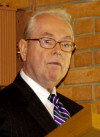 3/26/2006
- AHF of Washington, DC's annual 1848 commemoration.
The Chapel at Wesley Theological Seminary at American University
in Washington, D.C., was the setting for this year's commemoration which
featured speeches on Louis Kossuth and the implications of 1848 on recent 3/26/2006
- AHF of Washington, DC's annual 1848 commemoration.
The Chapel at Wesley Theological Seminary at American University
in Washington, D.C., was the setting for this year's commemoration which
featured speeches on Louis Kossuth and the implications of 1848 on recent
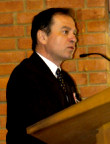 Hungarian politics and ethnic relations in the Carpathian Basin. Hungarian politics and ethnic relations in the Carpathian Basin.
Zoltan
Bagdy, master of ceremonies, opened the event and invited Bryan Dawson-Szilagyi
to lead the national anthems of the US and Hungary accompanied by David
Purger. Hungarian Ambassador Andras Simonyi delivered the opening remarks
and was followed by a performance of the "Rákóczi Induló"
(Rakoczi March) by child prodigy Szollös Sebestyén.
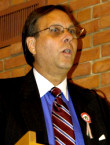 Frank
Koszorus delivered his speech "Kossuth in America" [downloadable
here]. Koszorus remarked, "As we see from Kossuth’s incredible
speech, the concept of local self-government has been an integral part
of Hungarians’ proud tradition, cherished by them not only today
when part of the nation lives scattered in countries neighboring Hungary,
but also when Hungarians lived within one border." Frank
Koszorus delivered his speech "Kossuth in America" [downloadable
here]. Koszorus remarked, "As we see from Kossuth’s incredible
speech, the concept of local self-government has been an integral part
of Hungarians’ proud tradition, cherished by them not only today
when part of the nation lives scattered in countries neighboring Hungary,
but also when Hungarians lived within one border."
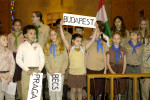 Bárczay
Sári, of the Bátori József Hungarian Scouts, presented
the Nemzeti Dal to be followed by the entire 4th scout troop who performed
"Emlékezés" (Remembrance). Bárczay
Sári, of the Bátori József Hungarian Scouts, presented
the Nemzeti Dal to be followed by the entire 4th scout troop who performed
"Emlékezés" (Remembrance).
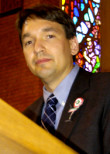 The
keynote speaker was Andras Ferenc Bodor who remarked, "Én
ahhoz a generációhoz tartozom, amelyik a márciusi
ifjak forradalmi attitudjét 1988-89-ben vitték a budapesti
utcákra a kommunista diktatúra hatalmi gépezetével
szemben. Ezzel a generációval szebben bánt a sors,
nekünk nem kellett az életünket áldoznunk a harcunk
sikeréért, és nem kellett a hazánkat elhagynunk
egy elbukott - mondhatnánk, hogy csak a hosszútávú
hatásában gyoztes - harc után." [download
his speech here]. The event was closed by a stirring speech Rev. Gábor
Nagy. The
keynote speaker was Andras Ferenc Bodor who remarked, "Én
ahhoz a generációhoz tartozom, amelyik a márciusi
ifjak forradalmi attitudjét 1988-89-ben vitték a budapesti
utcákra a kommunista diktatúra hatalmi gépezetével
szemben. Ezzel a generációval szebben bánt a sors,
nekünk nem kellett az életünket áldoznunk a harcunk
sikeréért, és nem kellett a hazánkat elhagynunk
egy elbukott - mondhatnánk, hogy csak a hosszútávú
hatásában gyoztes - harc után." [download
his speech here]. The event was closed by a stirring speech Rev. Gábor
Nagy.
 Learn
more about the Hungarian Scouts and the May 20th Gala Fundraiser to
benefit AHF and the Bátori József Hungarian Scout Troop
of Washington, DC. Learn
more about the Hungarian Scouts and the May 20th Gala Fundraiser to
benefit AHF and the Bátori József Hungarian Scout Troop
of Washington, DC.
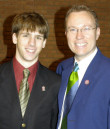
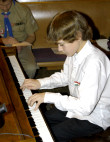 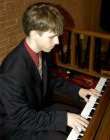
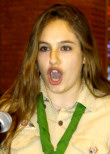
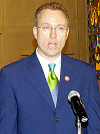 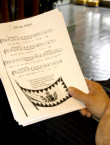
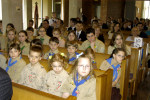
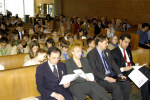
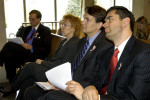
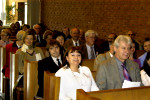
Photos - Bryan Dawson Szilagyi
[back to all 1848 news] |
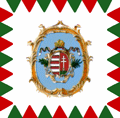 Shortcuts: Shortcuts:
Famous Quotes
"the house of Habsburg-Lorraine, perjured in the sight of
God and man, had forfeited the Hungarian throne."
Hungary, April 1849
"All for the people and all by the people. Nothing about
the people without the people. That is Democracy, and that is the ruling
tendency of the spirit of our age."
Spoken before the Ohio State Legislature,
February 16, 1852
About Louis
Kossuth
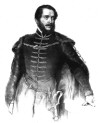 Kossuth
Lajos (b. 1802, d. 1894, pronounced co-shoot luh-yôsh)
was Governor of Hungary during fight for independence and democracy which
was eventually defeated by the union of the royalist Austrian Habsburg
and Russian Czarist Armies (1848 - 1849). Kossuth envisioned a federation
in the Kingdom of Hungary in which all nationalties participated in a
vibrant democratic system based on fundamental democratic principles such
as equality and parliamentary representation. The bloody conflict eventually
led to a great compromise known as the "Austro-Hungarian Empire,"
in which Hungary gained some autonomy. although Kossuth would have no
part in it and demanded full indepependence until his death. Kossuth
Lajos (b. 1802, d. 1894, pronounced co-shoot luh-yôsh)
was Governor of Hungary during fight for independence and democracy which
was eventually defeated by the union of the royalist Austrian Habsburg
and Russian Czarist Armies (1848 - 1849). Kossuth envisioned a federation
in the Kingdom of Hungary in which all nationalties participated in a
vibrant democratic system based on fundamental democratic principles such
as equality and parliamentary representation. The bloody conflict eventually
led to a great compromise known as the "Austro-Hungarian Empire,"
in which Hungary gained some autonomy. although Kossuth would have no
part in it and demanded full indepependence until his death.
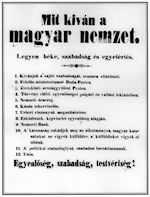 The speech from which the above excerpt is taken was given over a decade
before Lincoln's famed "for the people, by the people" speech
given at Gettysburg in 1863. Kossuth was the first foreign Statesman officially
invited to the US since the Marquis de Lafayette. His upcoming speech
in the Congress of the United States made the pre-civil war joint house
nervous due to his democratic views on equality of all men. Kossuth learned
English while in prison and exile and spoke to half the population of
the US who enthusiastically greeted and flocked to hear him. Despite Hungary's
epic struggle and Kossuth's brave and noble efforts, the US, the "Bastion
of Democracy" turned him away, empty handed. Hungary was alone again
in its fight for democracy in 1956, and didn't gain freedom until 1989. The speech from which the above excerpt is taken was given over a decade
before Lincoln's famed "for the people, by the people" speech
given at Gettysburg in 1863. Kossuth was the first foreign Statesman officially
invited to the US since the Marquis de Lafayette. His upcoming speech
in the Congress of the United States made the pre-civil war joint house
nervous due to his democratic views on equality of all men. Kossuth learned
English while in prison and exile and spoke to half the population of
the US who enthusiastically greeted and flocked to hear him. Despite Hungary's
epic struggle and Kossuth's brave and noble efforts, the US, the "Bastion
of Democracy" turned him away, empty handed. Hungary was alone again
in its fight for democracy in 1956, and didn't gain freedom until 1989.
Today, there are many reminders of Kossuth's impact on America and the
world. In North America, there is a Kossuth County in the state of Iowa,
a town with his name in Indiana, Ohio and Mississippi,
a settlement with a Kossuth Post Office is in Pennsylvania. In addition,
there are Kossuth statues and plaques in New York, Cleveland, Akron, New
Orleans, Washington, and Ontario, Canada. The Hungarian
Reformed Federation's building on Dupont Circle, in Washington, DC
is called Kossuth House with a memorial plaque commemorating his speech
on democracy. See the picture gallery and memorials on Louis
Kossuth in North America.
The renowned Ralph Waldo Emerson said in greeting Kossuth on his arrival
at Concord, MA, May 11, 1852:
"[we] have been hungry to see the man whose extraordinary eloquence
is seconded by the splendor and the solidity of his actions."
Kossuth was greeted with wild enthusiasm across the country. He was only
the second foreign leader (second to Lafayette) to address a joint session
of Congress. The American Hungarian Federation
dedicated a bust that now sits proudly in the US Capitol - it reads, "Louis
Kossuth, Father of Hungarian Democracy" [read more]
Audio
Resources
 Hear
Louis Kossuth Speak!
[Click Here] - This is the speech of Louis Kossuth which he gave for the dedication of the statue for the 13 Hungarian generals, who were executed at Arad, Hungary, on October 6, 1849 (Arad is in Rumania today after annexation due to the Treaty of Trianon in 1920 ).
Louis Kossuth was exiled after the fall of the Hungarian Liberation Fight of 1848 and made his permanent home in Torino (Turin), Italy. He could not attend the dedication of the monument at Arad, without risking arrest, so he recorded his speech in Hear
Louis Kossuth Speak!
[Click Here] - This is the speech of Louis Kossuth which he gave for the dedication of the statue for the 13 Hungarian generals, who were executed at Arad, Hungary, on October 6, 1849 (Arad is in Rumania today after annexation due to the Treaty of Trianon in 1920 ).
Louis Kossuth was exiled after the fall of the Hungarian Liberation Fight of 1848 and made his permanent home in Torino (Turin), Italy. He could not attend the dedication of the monument at Arad, without risking arrest, so he recorded his speech in 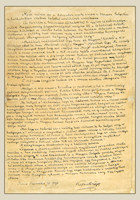 Turin, and sent it to Arad using the new technology of sound recording, called the phonograph. Turin, and sent it to Arad using the new technology of sound recording, called the phonograph.
The recording was made on September 20, 1890, when Kossuth was 88 years old. It is a sad fact that the monument Kossuth sent his speech for was torn down by the Rumanian government when they annexed Transylvania, along with Arad, in 1920, after World War I.
The original
recording on two wax cylinders for the Edison phonograph survives to this
day, although barely audible due to excess playback and unsuccessful early
restoration attempts. Lajos Kossuth is the earliest born person
in the world who has his voice preserved. Since the audio
is of such poor quality, here is it is transcribed in Hungarian and translated
to English (special thanks to Louis
Kossuth in North America)
Hungarian |
English |
| "A világ bírája
a történelem fog e kérdésre felelni. Legyenek
a szentemlékû vértanúk megáldottak
poraikban, szellemeikben a hon szabadság Istenének
legjobb áldásaival az örökkévalóságon
keresztül; engem ki nem borulhatok le a Magyar Golgota porába,
engem október 6-a térdeimre borulva fog hontalanságom
remete lakában látni a mint az engem kitagadott Haza
felé nyújtva agg karjaimat a hála hû
érzelmeivel áldom a vértanúk szent emlékét
hûségükért a Haza iránt, 's a magasztos
példáért, melyet az utódoknak adtanak;
's buzgó imával kérem a magyarok Istenét,
hogy tegye diadalmassá a velõkig ható szózatot,
mely Hungária ajkairól a Magyar Nemzethez zeng. Úgy
legyen Ámen!
Turin
September 20 1890
Kossuth Lajos |
"The judge of the universe,
history, will decide over this question. Should the saintly remembered
martyrs be hallowed in their ashes, in their spirit with the highest
blessings of the Lord of Liberty and through eternity; I can not
pay my sympathies to the ashes of the Hungarian Golgotha, but October
6 will find me on my knees in this reclusive home of exile, as I
open my arms to my disowning homeland. With gratitude's faithful
sentiments, I bless the martyrs' sacred memory for their faith in
their homeland and for the sublime example they left to their heirs:
with ardent prayer I beg the God of Hungarians to make their appeal
which echoes from the lips of Hungaria to the Hungarian Nation.
So be it, Amen!
Turin
September 20 1890
Lajos Kossuth |
|
|
Click to hear the recording: |
"Kossuth Lajos azt üzente,
elfogyott a regimentje.
Ha még egyszer azt üzeni,
mindnyájunknak el kell menni,
Éljen a magyar szabadság,
Éljen a haza ! |
Esik esõ karikára,
Kossuth Lajos kalapjára.
Valahány csepp esik rája,
Annyi áldás szálljon rája,
Éljen a magyar szabadság,
Éljen a haza!" |
Links
- AHF and the Kossuth Bust in the US Capitol
- AHF commemorating 1848
- President Bush Honors 1848 and Hungary's Contributions to Democracy
- HRFA's excellent Kossuth in America [visit]
- Select Speeches of Kossuth, Condensed and Abridged, with Kossuth's
Express Sanction [visit]
- Louis Kossuth, Mason And Apostle Of World Democracy [visit]
- Count Apponyi's Oration on the Death of Louis Kossuth [visit]
- Wikipedia - [visit]
and add your thoughts!
- Louis Kossuth in North America [visit]
- Kossuth County, Iowa [visit]
- Kossuth County, Iowa statue dedication
[visit]
- Dedication of statue to replace one destroyed by Rumanian occupation
forces in 1921: Gyergyócsomafalva, Transylvania [visit]
 Sign
up for the AHF mailing list. Sign
up for the AHF mailing list.
Your information is not shared!
Join online!

|



